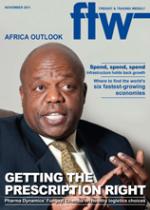Post-war Angola, the
Democratic Republic of
Congo, Zambia and Nigeria
all continue to grow beyond
expectations despite the world
facing yet another economic
meltdown.
Oscar S Muyatwa of the Trans
Kalahari Corridor Secretariat, a
Section 21 organisation founded
on a Public Private Partnership
(PPP) model, with the objective
of increasing transit traffic and
trade on the Trans Kalahari
Corridor, maintains that in
spite of the African market’s
negligible share of global trade,
it remains an essential source of
agricultural and raw materials
and mineral resources including
platinum, manganese, copper,
zinc, gold, and diamonds.
“On the one hand Africa
is a consumer market for
commodities such as secondhand
vehicle imports and
electronics. The buying power
of populous countries such
as Nigeria, Kenya and the
Democratic Republic of the
Congo cannot be ignored.
Nigeria, Ghana and Angola are
oil producers of note. Namibia
has offshore oil and gas
prospects. The growing interest
by China in African trade is
testimony to the importance of
the African market,” he told
FTW.
The biggest challenge
however lies in dealing with
African logistics and customs.
“Each region has its own
set of rules and regulations
and one must have the ability
to adapt to be able to work in
the different areas,” he said.
“A common challenge that
one faces in Africa is the lack
of infrastructure, while safety
and security remain a concern.
Corruption, congestion and
unpredictable policy shifts are
also problematic. All these
unfortunately result in the high
cost of doing business and the
high price of goods across the
continent.”
According to Muyatwa,
growing democratic governance,
peace and stability, along with
the growing buying power
resulting from exports of raw
materials and minerals, bodes
well for Africa.
“Modernisation in general is
a great opportunity for everyone
working in Africa, resulting in
a very positive outlook for the
continent,” said Muyatwa. “This
is particularly true if Africa
industrialises and thus exports
finished products – and if
regional integration serves as a
bargaining chip in improving the
general terms of trade between
Africa and the European Union
and the rest of the world.
“There is a need to use
growing Africa-China trade
as leverage in dealing with
the Americas and Europe.
Africa should however adopt
modest policies and regulations
to attract direct foreign
investment.”
Biggest challenge lies in dealing with logistics and customs
30 Nov 2011 - by Liesl Venter
0 Comments
Africa Outlook 2011

30 Nov 2011
30 Nov 2011
30 Nov 2011
30 Nov 2011
30 Nov 2011
30 Nov 2011
30 Nov 2011
30 Nov 2011
30 Nov 2011
30 Nov 2011
Border Beat
Today 12:30
17 Jun 2025
Poll
Featured Jobs
New
New
